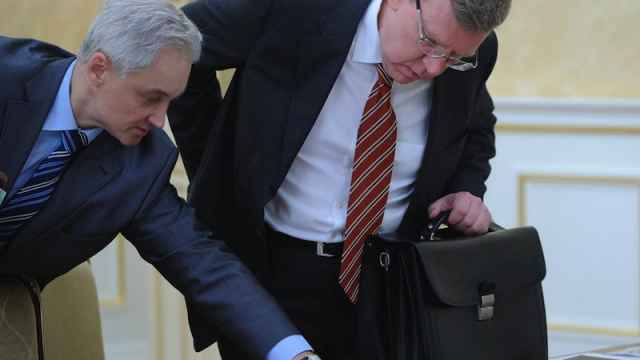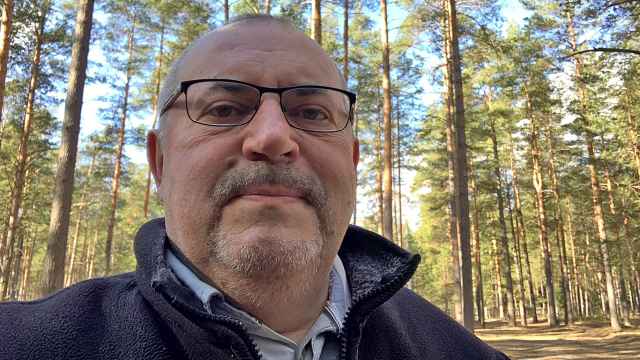Nastya Bendukidze only discovered her father’s real identity six years before he died. Kakha Bendukidze, the great post-Soviet businessman, billionaire, reformer and philanthropist, had never even mentioned to friends or reporters that he might have had a daughter. And until the day he broke the news to her, while paying a visit to Nastya who was studying in King’s College, London, he was just “Uncle Kakha” — a family friend, a supporter.
“When I turned 18, he told me simply: ‘I am your biological father’,” she tells The Moscow Times. Six short years followed before her father died in November 2014, but it was enough time for the pair to travel together and get to know each other. It was only in the last year that Nastya understood that he had plans for her, and that those plans would turn her life upside down.
A Towering Figure
Kakha Bendukidze was a model reformer, a towering figure in post-Soviet history. A libertarian by ideology, he put his ideas into practice when he was appointed Georgia’s economy minister after the Rose Revolution in 2003. He cut the number of taxes in the country from 20 down to six. He helped reform the court system and the labor code. He was the architect of perhaps the most successful anti-corruption reforms in the region. Bendukidze’s reforms had an instant effect, and revived the struggling Georgian economy. But this was not enough for him. In 2009, Bendukidze quit political life to develop his “Free University,” founded a year earlier.
The idea was to create a place which would force young Georgians to really think, to bring up a new Georgian elite. Students remember his giant figure, in a black sweatshirt with the “Free Uni” logo, wandering the corridors, talking and arguing with students and faculty members. Two years later, in 2011, he also bought Georgia’s dilapidated Agricultural University, which then ranked 37th out of 40 Georgian universities.
In June 2014, however, Bendukidze was forced to leave Georgia. The new authorities threatened him with a criminal investigation and potential arrest. It was a major personal drama. “They are trying to shut down my university by any means—revoking its license, not approving the results of our investment,” he wrote to this reporter in September that year. “The court is opening a criminal case, investigating our university’s property transactions, removing us from a competition we won for a U.S. government grant.”
Not only was Bendukidze heartbroken, he was also seriously ill. He died while in political exile in London, following an unsuccessful heart operation. The businessman spent his final months suffering, watching from afar as his friends and former colleagues were imprisoned by the new government. He also received prison threats from the Georgian government, who his daughter now blames for his death. For Nastya, it was a black period, and the biggest loss in her life. “I lost my papa, my best friend, teacher, my confidant, who consulted with me about every small and big step in my life: from what to wear to the prom or how to behave around men, to how improve my education,” she says.
More from The Moscow Times: What does visa-free travel to the EU mean for Georgia and Ukraine?
Fight for Inheritance
In the years that they knew each other as father and daughter, the Bendukidzes spoke on the phone every day and often travelled together. And it was during one final trip around the world together that he first revealed his plan, she says: to leave most of his savings to his universities, and the management of those universities to her. “I knew that the universities were his favorite children,” she says. “Bill Gates isn’t leaving riches to his kids and easy money spoils people.”
The father and daughter avoided talking about politics on that last tour. A few years earlier, Mikhail Saakashvili’s party, the United National Movement, had been voted out of office. Bendukidze saw that his government had made mistakes and he strongly disagreed with how it sometimes abused authority, Nastya says. “But even after quitting his post in the government, he never stopped feeling loyal to the team and continued to help his friends,” says Nastya.
Kakha Bendukidze articulated five wishes for his only daughter: lose weight, get a full education, learn Georgian, start a business, and die happily. He wanted his daughter to become strong and successful, and he trained her to survive in the business world. “Once, we were traveling in Los Angeles, and he said that if I stayed at a cheaper hotel than the one he was staying in, he’d give me the difference,” she says. “I did exactly that, but every time I asked for my reward, I was told the payment would come tomorrow. I realized what he was teaching me: to fight for my rights, and to survive in Spartan conditions.”
Nastya showed a Spartan instinct in the months following her father’s death. In three separate, acrimonious and controversial court cases—in Georgia, Russia and Great Britain— she was eventually recognized as Kakha’s biological daughter. “My father’s example showed that you need to keep your spirits up,” she says.
Georgian Chapter
Now living in Tbilisi, Nastya has already fulfilled one of her father’s wishes by taking up the Georgian language. Tall, slim, and still only 25-years-old, she is somewhat of a local celebrity. “Sometimes I feel like a mayor running around our campus with 5,000 residents,” she says. Looking back at her legal struggle for the universities now, Nastya tries to see the funny side. “I was losing so much of my hair so much back then that I thought I would be bald and look exactly like Kakha,” she said.
Nastya is now the director of the Knowledge Fund, an umbrella foundation that owns both the Free and Agricultural universities. This year, the National Assessment and Examination Center ranked Bendukidze’s Free University as Georgia’s best, and gave the Agricultural University second place.
A Message from The Moscow Times:
Dear readers,
We are facing unprecedented challenges. Russia's Prosecutor General's Office has designated The Moscow Times as an "undesirable" organization, criminalizing our work and putting our staff at risk of prosecution. This follows our earlier unjust labeling as a "foreign agent."
These actions are direct attempts to silence independent journalism in Russia. The authorities claim our work "discredits the decisions of the Russian leadership." We see things differently: we strive to provide accurate, unbiased reporting on Russia.
We, the journalists of The Moscow Times, refuse to be silenced. But to continue our work, we need your help.
Your support, no matter how small, makes a world of difference. If you can, please support us monthly starting from just $2. It's quick to set up, and every contribution makes a significant impact.
By supporting The Moscow Times, you're defending open, independent journalism in the face of repression. Thank you for standing with us.
Remind me later.







